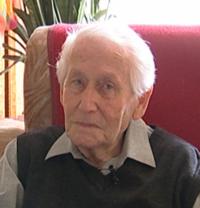Either you get accustomed or snuff it
Richard was born on February 27, 1923 in the Czech town of Těšín, where his parents, mother of Slovak and father of Polish origin, had settled down. When he was three, his parents divorced and Richard was given in charge of his grandfather. As his father was Polish, Richard attended Polish elementary school in Těšín, later became trained in locksmithing, and went in for sports and scouting. In 1938 the town was overrun by Poland and many people were forced to move out. Richard along with his mother and grandfather left for Ostrava, where they also lived when the Second World War started. As they feared for their life and future, they looked for a shelter where they could feel safe from the Germans, and the Soviet Union seemed to be so due to an effective propaganda. In 1939 he and his mother decided to cross the borders and managed to get to the Ukrainian town of Lviv through the town of Nisko in the eastern Poland. However, Richard arrived there without his mother. They had to be in hiding for some time when they were in Nisko and there they became separated. After his illegal arrival in Lviv, the Soviet guards considered sixteen-year old Richard to be a German spy and as he refused to accept the Soviet citizenship he was immediately arrested and imprisoned. After a month spent in custody in really inhuman conditions, he was along with other prisoners transported in freight cars into gulag. There was only hard work in forests, hunger, filth, diseases, and the sight of people slowly dying from exhaustion awaiting him. He went through several labour camps and as he said, when thanks to General Ludvík Svoboda, the Czechoslovak military forces were being formed in the Soviet Union, he was released from gulag and joined hundreds of volunteers, the Czechoslovak citizens, who enlisted from different parts of the USSR. Richard moved to northern Kazakhstan, where besides of work in fields, with tractors, and in workrooms, he finished the military training for the Dzerzhinsky Regiment in Chkalovsk territory. Along with the Czechoslovak military forces in October 1944 he gradually managed to get to Slovakia. He participated in liberating fights in Liptovský Mikuláš, Ružomberok, on Martinské hole, or in Žilina and after crossing the river Váh in Považská Teplá village, they headed to Vsetín and to Prague. At the end of 1945 he was transferred from Prague to Bratislava where he left the army. Firstly he was enthusiastic about an incoming regime, which he regarded as an opposite to the cruel Nazism, and he even joined the Communist Party, but soon he found out that an oppressive totalitarianism replaced another. He started to build a new family life gradually and worked in Pozemné stavby company for more than forty years.

